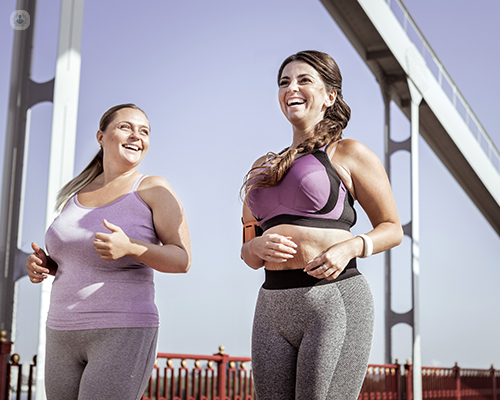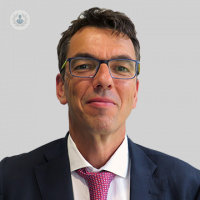Weight loss surgery aftercare
Escrito por:Losing weight can improve not only how you feel about yourself, but it can greatly improve your life expectancy by reducing health risks associated with excess body weight like type 2 diabetes, high blood pressure heart disease, joint disease, sleep apnoea, fatty liver disease and some types of cancer. Bariatric or weight loss surgery is recommended for adults with a body mass index (BMI) of over 40 or a BMI of over 35, accompanied by another disease, after all non-surgical weight loss measures have failed.
Mr Bart Decadt talks to us about what happens after weight loss surgery and if there is a specific diet that must be followed.

When can I leave hospital following surgery?
Patients can go home when they are pain-free, fully mobilised, drinking free fluids and have a normal early warning score (which means normal observations such as a normal pulse, blood pressure, temperature, and urine output). This is the case for almost all patients the day after weight loss surgery, so after a one-night hospital stay.
What does a diet plan post-surgery look like?
Healthy eating is essential after surgery. It’s recommended to eat around 1500 calories a day to provide good weight loss. It helps to use a 7-inch plate and small cutlery.
During the first 2-3 weeks after surgery food will be in liquid form, which may cause constipation or diarrhoea until solids are re-introduced. If constipation continues, natural fruit juice like prune or fig juice can be of benefit. Foods such as bread, chicken, tough meats and the skin on some fruits and vegetables can be difficult to tolerate in the long term. Look for foods that are easy to digest to allow the digestive system to heal. It’s also advised to avoid foods with more than 8g of sugar in every 100 grams to aid with weight loss.
It’s important that you drink at least two litres of water a day, that’s eight to ten cups following surgery, as fluid intake is reduced following bariatric surgery. If your urine is a pale straw colour, then you’re drinking enough. Fizzy drinks should be avoided as they can cause excess gas and discomfort following the operation.
Some patients will suffer from trapped gas and bloating for a few days following their operation, for which fennel and peppermint tea can help relieve these symptoms. Your surgeon will give you a diet plan to follow and will help you to make lifestyle changes that will ward off the weight.
When can I start to exercise?
It’s encouraged not to increase physical activity post-operation until you are back to your pre-operative normal after about two weeks. Exercise will help to relieve symptoms of trapped gas and reduce the risk of blood clots in the legs (DVT) and help to increase your metabolism. However, it’s recommended to walk for the first two weeks, after which you can exercise for 30 minutes three to four times a week.
What are the signs of any side effects post-surgery?
Your bowel movements may be less frequent post-surgery as you won’t have the same volume of food passing through. This will improve when you gradually start reintroducing bulk foods and fibre into your diet.
Post-surgery tiredness is also quite common. Small meals are recommended throughout the day to keep your energy levels up because your body is used to a much greater quantity of calories. As with bowel movements, your energy levels will improve once you begin to eat bigger meals.
Some patients may experience stomach pains and nausea, however, if this becomes a frequent occurrence, it’s advised to contact your bariatric surgeon.
If you’d like more information about bariatric surgery and aftercare, why not book a consultation with Mr Bart Decadt.


